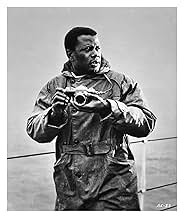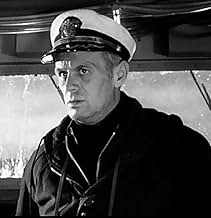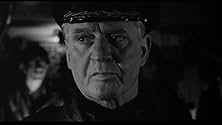IMDb RATING
7.3/10
6.6K
YOUR RATING
An American destroyer Captain is determined to confront a Soviet submarine caught violating territorial waters. Perhaps too determined.An American destroyer Captain is determined to confront a Soviet submarine caught violating territorial waters. Perhaps too determined.An American destroyer Captain is determined to confront a Soviet submarine caught violating territorial waters. Perhaps too determined.
- Director
- Writers
- Stars
- Nominated for 1 BAFTA Award
- 1 nomination total
James MacArthur
- Ens. Ralston
- (as James Macarthur)
Mike Lennox
- Lt. Krindlemeyer U.S.N. - Bridge
- (as Michael Graham)
Stephen Schreiber
- Seaman 2nd Class - Bridge
- (as Stephen Von Schreiber)
- Director
- Writers
- All cast & crew
- Production, box office & more at IMDbPro
7.36.5K
1
2
3
4
5
6
7
8
9
10
Featured reviews
FailSafe on a Surface vessel.
Along the same lines as FailSafe this is a tense Cold War drama with a cat and mouse game going on between an iron willed Navy Captain and an essentially unseen Soviet submarine. Great performances all around are what make this a good film. Richard Widmark is great as the somewhat tyrannical ships skipper who has his crew drilled, trained and poised for all out war up to the breaking point. Sidney Poitier as always does another superb job as the journalist aboard to do a story of a Navy deployment and gets more than what was expected. Despite the fact that an individual like the Poitier character would not enjoy that much freedom aboard a US Naval vessel this motion picture is quite realistic. Martin Balsam and James MacArthur also put in outstanding performances with Balsam as a newly arrived unappreciated ships doctor and MacArthur as an Ensign who is dogged endlessly by his commanding officer.
best of its kind
Channel surfing, I stumbled across this movie on TCM and must say, "Wow!" As a child during the Cold War, I remember the tension between America and Russia, which this film captures well -- at least from the U.S. perspective. Richard Widmark's performance tops that of Humphrey Bogart in "The Caine Mutiny," strawberries or not. Sidney Poitier fits his role like a glove -- the scene between Poitier and Widmark in the latter's cabin is splendidly acted, allowing the viewer to get inside Widmark's head while not giving away too much -- and Martin Balsam gives another example why he was one of the screen's greatest supporting actors. It's better than "Fail Safe," sparing us Henry Fonda's hysterics as president. The tension builds aboard ship until a breathtaking climax. One worth watching.
The Hunt For Big Red In October
I must confess I'd not heard of this film as it was off my radar (no pun intended) despite starring those two fine actors Sidney Poitier and Richard Widmark in the leads and the solid Martin Balsam in support. More fool me as it proved to be a fine, gritty Cold War thriller, highlighting explicitly then and still, I'd contend, now, that one wilful or accidental action in the heat of the moment could lead to catastrophe for the world. The film skilfully combines a study of men under pressure with the wider political picture, at the same time cleverly invoking the classic story of Moby Dick, with Widmark's Captain Freelander as obsessed with catching a fleeing Russian submarine as old Captain Ahab was his pesky whale.
All the action takes place on Freelander's US navy destroyer encompassing a gradually increasing character examination of the wilful Captain, driving his crew to exhaustion and the end of their wits by keeping them constantly at attention or GQ as it's called here, so that in the end a simple misunderstanding by a pressurised, even terrorised young officer of a phrase used by the captain in conversation leads to disaster. The abrupt ending is particularly memorable, the better for being so inevitable and brutal.
Widmark as the crusty old captain is excellent in his portrayal of this particular single-minded sailor, while Poitier is also fine as the journalist who by questioning the captain's methods effectively acts as the conscience of the film, for once his skin colour having no bearing on his character''s relevance to the plot. Balsam too steps up as the passed over new medical officer who yet predicts the climactic outcome from way back.
Tautly directed in black and white, the tension is palpable as the American ship closes in on its prey and nerves become frayed to breaking point on the bridge, in so doing making an early case for greater psychological consideration due to crew members as advocated by Balsam's character.
Topical and relevant, especially with recent events echoing even today in Syria, this is an unflinching and superbly acted contemporary thriller which deserves to be better known.
All the action takes place on Freelander's US navy destroyer encompassing a gradually increasing character examination of the wilful Captain, driving his crew to exhaustion and the end of their wits by keeping them constantly at attention or GQ as it's called here, so that in the end a simple misunderstanding by a pressurised, even terrorised young officer of a phrase used by the captain in conversation leads to disaster. The abrupt ending is particularly memorable, the better for being so inevitable and brutal.
Widmark as the crusty old captain is excellent in his portrayal of this particular single-minded sailor, while Poitier is also fine as the journalist who by questioning the captain's methods effectively acts as the conscience of the film, for once his skin colour having no bearing on his character''s relevance to the plot. Balsam too steps up as the passed over new medical officer who yet predicts the climactic outcome from way back.
Tautly directed in black and white, the tension is palpable as the American ship closes in on its prey and nerves become frayed to breaking point on the bridge, in so doing making an early case for greater psychological consideration due to crew members as advocated by Balsam's character.
Topical and relevant, especially with recent events echoing even today in Syria, this is an unflinching and superbly acted contemporary thriller which deserves to be better known.
Brilliant Cold War thriller
For me, this is one of the best movies of the cold war era, up there with the likes of "Fail Safe" and "On the Beach". Extremely well directed and acted, it should be on any collector's shelf as DVD when so released. The tension is maintained throughout and the climax is one of the best in a film that I have ever seen. Also significant is the fact that Sidney Poitier's colour is never an issue either verbally or by implication, something quite remarkable for a movie made over 35 years ago.
A classic from a classic time in movie cinema
Excellently acted and directed. I came to this movie late, too. I've always held the better known "Dr. Strangelove" and "Fail Safe" close to my heart, but I happened to catch "Bedford" on a cable channel a couple years ago and was completely blown away. Absolutely brilliant plot device by keeping the soviet sub unseen, mysterious; focusing instead on the character dynamics on the destroyer.
No outrageous special effects, huge explosions, ridiculously unbelievable stunts, or mannered performances. Why can't Hollywood make politically suspenseful films like this, "Dr. Strangelove", "Fail Safe", and "Seven Days In May" anymore???? Of course, I know the answer. Modern movie audiences have the attention span of a gnat, the cerebral tenacity of a chipmunk, and the spoiled expectations of a pampered child.
No outrageous special effects, huge explosions, ridiculously unbelievable stunts, or mannered performances. Why can't Hollywood make politically suspenseful films like this, "Dr. Strangelove", "Fail Safe", and "Seven Days In May" anymore???? Of course, I know the answer. Modern movie audiences have the attention span of a gnat, the cerebral tenacity of a chipmunk, and the spoiled expectations of a pampered child.
Did you know
- TriviaAlthough by this point Sidney Poitier had been making films for 15 years, this was the first film he made in which his race was neither mentioned nor relevant.
- GoofsWhile at General Quarters (battle stations), some officers of the USS Bedford are shown wearing dress blue uniforms. In the mid-1960s, both officers and chiefs wore khaki uniforms while at sea.
- Quotes
[after Finlander orders an anti-submarine rocket armed]
Commodore Schrepke: This is insane!
Captain Finlander: Now don't worry, Commodore. The Bedford'll never fire first. But if he fires one, I'll fire one.
Ensign Ralston: [launching the rocket] Fire One!
- Alternate versionsReportedly, there are two versions with different endings. One version ends with a missile being fired and a torpedo being released from the sub seconds before. In another version the sub is destroyed, and later that evening the German commodore is found aiming a .45 at the nose cone of a live missile. The captain asks why, the commodore gives some reply and pulls the trigger. Mr. Munceford is blown over the side, but survives.
- ConnectionsFeatured in WatchMojo: Top 10 Cold War Movies (2014)
- How long is The Bedford Incident?Powered by Alexa
Details
- Release date
- Countries of origin
- Languages
- Also known as
- Al borde del abismo
- Filming locations
- Production companies
- See more company credits at IMDbPro
- Runtime
- 1h 42m(102 min)
- Color
- Aspect ratio
- 1.85 : 1
Contribute to this page
Suggest an edit or add missing content





































